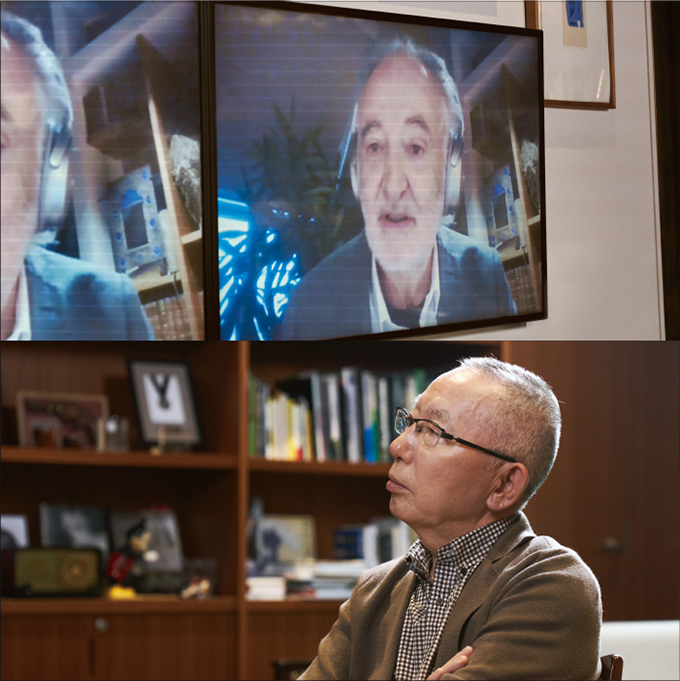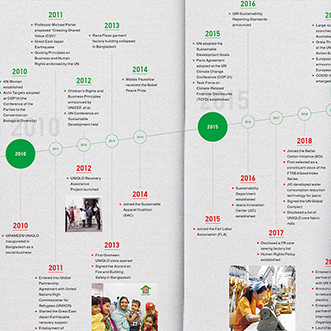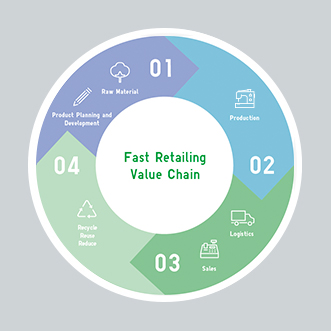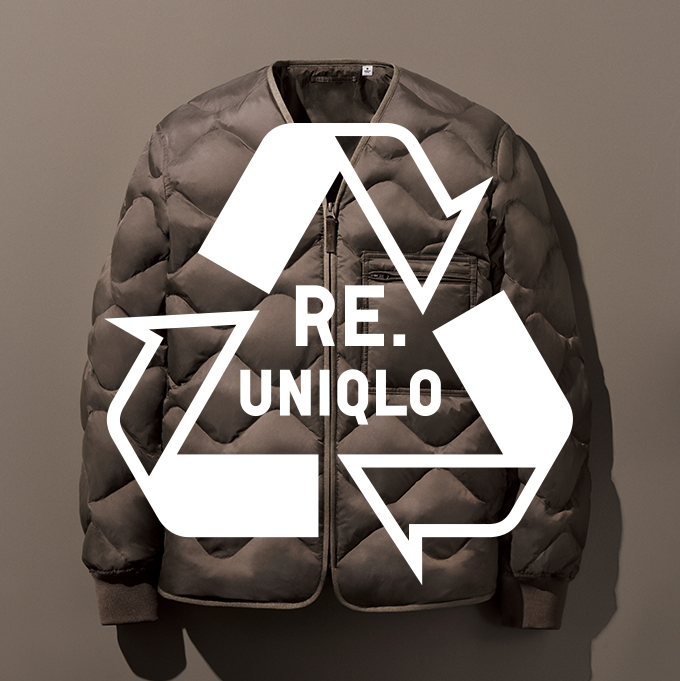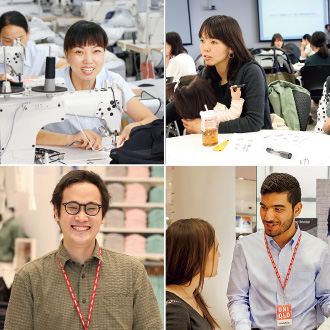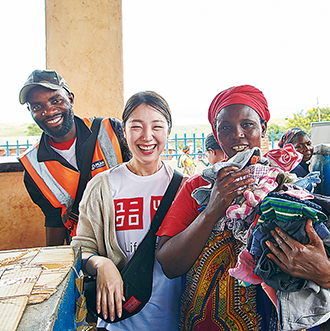Rules shared globally — is it possible?
YanaiI fully agree with the idea and action of altruism. Do you think that
altruism is the solution to all problems?
AttaliIt is worth considering, if we succeed in sharing certain rules globally,
to place altruism as the core of actions by people. The rule of law. This is
difficult to achieve, but one of the initiatives taken by the EU was this
integration by law. The countries in the EU cooperated to lay down a
common set of rules. The population of the EU is under 450 million. This
may be less than one-tenth of the global population, but the integration
cannot be considered small, and it was realized by having a common set
of rules. Our way of thinking and actions must be globalized in the global
market. Globalization of products alone is not enough to realize a
sustainable and open market.
Obviously, it is very difficult to share a legal system for all humanity.
However, it may be viable, for example, for Fast Retailing and competing
global apparel companies to come together, make agreements for the raw
material handling, working conditions and so on, create shared rules based
on them, and conduct corporate activities. This starts with companies, not
the state or the government.
Yanai I do not think that rules will provide a fundamental solution. If only
global apparel companies cooperate, we may end up only working within
our conventional perspectives and defending our own rights. However,
Japanese tend to feel more comfortable working within such a framework,
and many managers may prefer a common set of rules in place. Since the
Meiji Restoration, Japanese have been good at following and working
under the direction or guidance set by “higher-ups.” Because you don’t
need to think for yourself as long as you are working hard for the goals and
conditions provided by the government. The government also thinks about
protecting and encouraging companies. However, this may make it
impossible for them to change their course if things go in the wrong
direction.

Job freedom vs. lifetime employment
YanaiHow are French people trying to solve the problem of inequality?
AttaliMainly by taxation. The tax rate in France is one of the highest in
Europe. People believe this is a worthwhile price to pay to solve inequality
and improve general wellbeing and welfare. The Scandinavian nations also
have similarly high taxation rates. In return, they provide education and
medical care unconditionally. High taxes are a system of altruism, and are
rules of consideration for others. A contrasting country is the United States.
They have a low tax rate. However, in the United States, it is practically
impossible to get advanced medical care if you do not have health
insurance.
Carbon footprint is a major pressing issue, and it is necessary to introduce
a carbon tax on commodities to address this. Carbon footprint is not only a
problem for manufacturing but also for importing and exporting across
countries. This cannot be solved by a single country, and the involvement
of globally operating companies is crucial, among other things. This is the
reason why I believe that the various problems Mr. Yanai pointed out
cannot be solved entirely on a country basis, and global rules are required.
Yanai It is important not to end up with protectionism and groupism. I
believe it is crucial for individual companies around the world to freely
engage in economic activities. In my opinion, it is not right to make the
rules first and then instruct them to go in the same direction as a group.
The tax rate was not so high in Japan in the past. However, as the birthrate
declines and the population ages, the country is shifting to higher taxes
due to the scarcity of financial resources for health and social welfare.
AttaliThere are 1.9 children per family on average in France. It is 1.4 in
Japan. Also, most women in Europe work. People typically do not work for
the same company until they retire—in several European countries, they
change their jobs every three to five years. People spend their entire lives
being educated and trained, and improving their abilities. Just like football,
the team is important, but so is fully mobilizing each player’s abilities and
potential. Individual abilities can improve further by transferring to another
team and expanding playing opportunities. This is the same for workers.
Society is also responsible for discovering things individuals are good at
and the skills they should improve throughout their lives. This is the idea
that a flexible society pays a salary and provides training
opportunities at the same time. Individuals improving themselves
throughout their lives will eventually enrich society.

YanaiAs you mentioned, more and more people are thinking that
the role of lifetime employment may have come to an end. There is
no denying that there is a chance for an individual to develop their
abilities by changing their job. However, I believe that lifetime
employment, not as a system but as a result, is good for both the
company and the individual. If a company becomes a group of
individuals who repeatedly change their jobs, it is difficult to
develop collective or tacit knowledge. When it comes to working
and creating something, I believe that deepening relationships and
communication with co-workers will develop individual skills and support
the company. Even a talented individual may not always perform well
immediately. If you change companies, there will inevitably be some tasks
you need to learn from scratch, no matter how good you are. We may be
able to fully utilize our potential when our objectives and those of the
company are aligned and work with a long-term view. Just like a team play
in football, I believe it is ideal when everyone works in the same direction
as their manager and aims for their goal. The idea of lifetime employment
might be hard for people from Europe to understand, though.
Attali I think some Europeans agree with your idea, Mr. Yanai. On the other
hand, there must be more and more Japanese people who want to be free
from the system of lifetime employment and work more freely—though it is
dangerous to put the desire for freedom above everything else. However, I
think it has become a global consensus that individuals are free to choose
how and where they work. By the way, there is a question I want to ask. Do
you think there can be such a thing as a “lifetime consumer”?
Yanai I believe that we must aim to operate as a company that creates
lifelong consumers as a result of our actions. Of course, consumers are
free to choose. Regarding lifetime employment, I don't think it is
unconditionally a good system, obviously. Lifetime employment that has
lost its substance is rather harmful. Individuals are free. Companies are
free. These are undeniable principles. However, I also believe we should
aim for a corporate entity that utilizes the accumulated collective
knowledge of an employee. There is a power lifetime employment exerts in
this sense. The operations of a company cannot be successful with the
power of a single individual. By the way, I had the chance to speak with
some people from France recently, and I found out that more of them are
working with a lot of enthusiasm in Japan these days.
AttaliI think it is because they know the value of going out from their
country and gaining a unique experience. It would be nice if more Japanese
people would come and work in France.
YanaiIndividuals live freely and work globally, participating in local
communities and contributing to society. This may be a first step to realize
a world without wars or conflicts. In that sense, the roles and
responsibilities of companies are even greater.
Attali It would be wonderful if we have another opportunity to discuss the
future of companies or the apparel space in the 21st century from a
long-term perspective. I’d love to see you again and talk to you.





